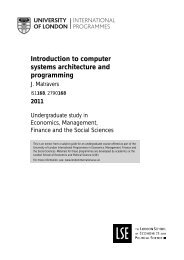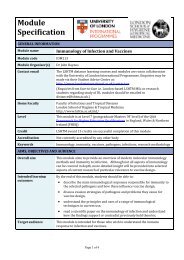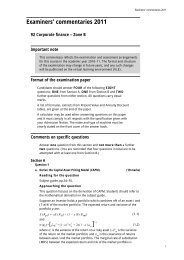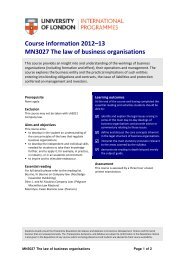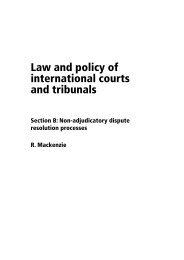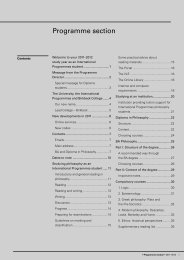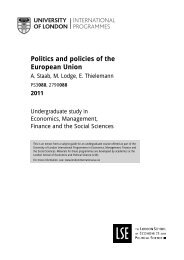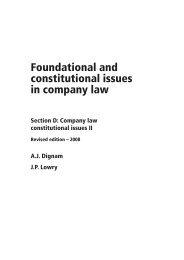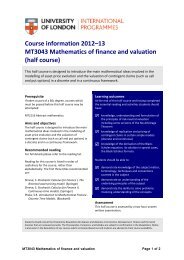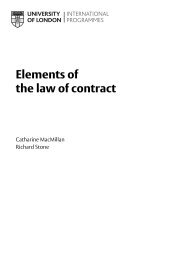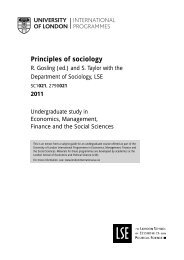Public law - University of London International Programmes
Public law - University of London International Programmes
Public law - University of London International Programmes
You also want an ePaper? Increase the reach of your titles
YUMPU automatically turns print PDFs into web optimized ePapers that Google loves.
page 34 <strong>University</strong> <strong>of</strong> <strong>London</strong> <strong>International</strong> <strong>Programmes</strong><br />
Holding ministers to a common position is not always easy. In times <strong>of</strong> disagreement<br />
over key issues it has been the practice, though it is rare, to waive or lift the<br />
convention to allow free debate. This occurred twice in the last century, once over<br />
the state <strong>of</strong> the economy in the 1930s and once in the 1970s over membership <strong>of</strong> the<br />
European Community (now EU). On both occasions, once there had been full public<br />
debate and a consensus formed, the convention was restored.<br />
Collective ministerial responsibility assumes that there is a single-party government.<br />
Where, as in 2010, a Coalition Government is formed <strong>of</strong> two (or more) political parties,<br />
the convention is put under strain and may prove unworkable when the political<br />
parties have differing views on various issues.<br />
3.5.2 Individual ministerial responsibility<br />
As with collective responsibility, there are two aspects to this concept. The first is<br />
that a minister is expected to conduct himself or herself in an appropriate manner.<br />
Any financial or sexual misconduct may lead to demands for resignation. You should<br />
be able to cite examples <strong>of</strong> where such conduct has led to resignations. The second<br />
aspect is that a minister is accountable to Parliament for the management <strong>of</strong> his or her<br />
government department. It used to be the case that any serious failures in policy or<br />
administration would result in a minister’s resignation. You should consider the case <strong>of</strong><br />
Crichel Down in 1954 as an illustration <strong>of</strong> this (see Barnett, Chapter 10, Section: ‘The <strong>Public</strong><br />
Service Committee Report: ministerial accountability and responsibility’). However, the<br />
position is nowadays by no means clear-cut. The main reason for this is that a distinction<br />
has been developed between responsibility for policy failures and responsibility for<br />
operational matters, with ministers refusing to take the blame for administrative failures.<br />
Accordingly, the idea <strong>of</strong> ministerial responsibility has become divorced from the sanction<br />
<strong>of</strong> resignation for departmental failures and it is more accurate to speak <strong>of</strong> ministerial<br />
‘accountability’ rather than ‘responsibility’, other than where a minister is personally at<br />
fault.<br />
3.5.3 Authoritative works<br />
In addition to the above sources <strong>of</strong> the constitution, the writings <strong>of</strong> respected<br />
constitutional authorities such as Sir William Blackstone (right), A.V. Dicey and Sir Ivor<br />
Jennings may on occasion be relied on in courts <strong>of</strong> <strong>law</strong> to aid interpretation.<br />
Self-assessment questions<br />
1. What are the principal sources <strong>of</strong> the constitution?<br />
2. What is the essential characteristic <strong>of</strong> a source which is deemed constitutional?<br />
What, for example, distinguishes the status <strong>of</strong> the Act <strong>of</strong> Union with Scotland <strong>of</strong><br />
1707 from the Road Traffic Act 1983?<br />
3. What is a ‘constitutional convention’?<br />
4. How can conventions be distinguished from understandings, habits, practices<br />
and legal rules?<br />
5. Which Act <strong>of</strong> Parliament:<br />
a. Prevents Roman Catholics from succeeding to the Crown?<br />
b. United England and Scotland under a single parliament?<br />
c. Incorporates the majority <strong>of</strong> substantive rights under the European Convention<br />
on Human Rights into UK <strong>law</strong>?<br />
Sample examination questions<br />
Question 1 Should all or any <strong>of</strong> the conventions <strong>of</strong> the constitution be given statutory<br />
force?<br />
Question 2 To what extent is it possible or desirable to define clearly the conventions<br />
<strong>of</strong> individual and collective ministerial responsibility?



